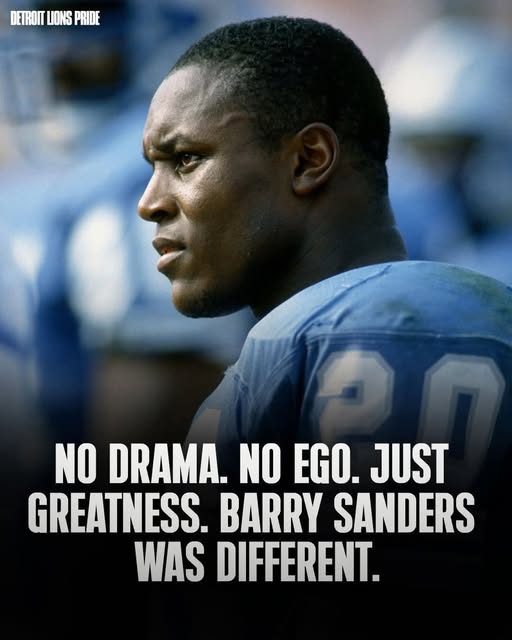In an era where charisma often overshadows character and self-promotion reigns supreme, Barry Sanders carved his legacy in the most unconventional of ways — by saying nothing at all. He didn’t spike the ball. He didn’t trash talk. He didn’t demand the spotlight. And yet, more than two decades after he last took the field, Barry Sanders remains one of the most revered figures not just in Detroit Lions history, but in the annals of professional sports.
This is the story of how a soft-spoken man from Wichita, Kansas became the gold standard for humility and greatness — and why his silence echoes louder than most players’ screams.
Humble Beginnings in Wichita
Born on July 16, 1968, Barry Sanders grew up in a working-class household under the stern but loving watch of his father, William Sanders. Known for his discipline and high expectations, William instilled a sense of humility and hard work in Barry and his siblings. It was a foundation that never left him.
Barry wasn’t even the starting running back when he arrived at Oklahoma State University. In fact, he spent his first two years backing up Thurman Thomas — another future NFL legend. When Thomas went pro, Sanders seized the opportunity in historic fashion. In the 1988 season, Barry rushed for 2,628 yards and 37 touchdowns, shattering the NCAA single-season rushing record and securing the Heisman Trophy. Yet even then, he rarely granted interviews and consistently deflected praise to his teammates and coaches.
Detroit’s Gift — and Curse
When the Detroit Lions selected Barry Sanders with the third overall pick in the 1989 NFL Draft, they were desperate for a savior. Detroit had long struggled in the NFL wilderness, and the hope was that Sanders could inject life into a perennially downtrodden franchise. He did more than that. He became the team’s heartbeat.
In his rookie season, Sanders ran for 1,470 yards and 14 touchdowns, winning NFL Offensive Rookie of the Year. By his second season, he was the league’s most electrifying back. His style was one of fluid improvisation: spinning, juking, disappearing into piles and emerging on the other side untouched. One second he’d be caught behind the line of scrimmage, and the next he’d be sprinting 50 yards downfield.
And yet — no celebrations. No end zone dances. No taunting. Just a calm jog back to the sideline, football handed to the referee like a humble offering.
A Career of Milestones
Over 10 seasons in the NFL, Sanders amassed 15,269 rushing yards, ranking fourth on the all-time list. He was selected to the Pro Bowl in every season of his career. He won NFL MVP in 1997, when he rushed for 2,053 yards — including an incredible streak of 14 straight games with over 100 rushing yards.
He joined Walter Payton as the only players at the time to surpass the 15,000-yard mark. He did it behind offensive lines that were rarely elite, often carrying the Lions on his back — sometimes literally — to playoff berths and nine-win seasons.
But perhaps the most incredible Barry Sanders stat is this: he lost yardage on over 1,100 carries. Why? Because he was always searching for daylight, always trying to make something out of nothing — and often succeeding. His style was risky, yes, but thrilling. Every time he touched the ball, the stadium held its breath.
The Anti-Superstar
While the NFL spotlight shined on boisterous stars like Deion Sanders, Michael Irvin, and Brett Favre, Barry Sanders stayed quiet. He didn’t seek endorsement deals or late-night interviews. His fame was earned purely on performance.
In a game that often rewards swagger, Barry was almost paradoxical. Reporters sometimes criticized him for being too quiet. But fans — especially in Detroit — adored him. They saw his grace not just on the field, but off it. No scandals. No controversies. Just a man who played the game because he loved it.
Sanders’ humility wasn’t an act; it was his core. After breaking 2,000 rushing yards in 1997, he barely raised his arms. After earning MVP honors, he diverted credit to his offensive line and coaching staff. It wasn’t false modesty — it was who he had always been.
The Sudden Goodbye
Then came the unthinkable.
On July 27, 1999 — just one season after his MVP campaign and only 1,457 yards away from breaking Walter Payton’s all-time rushing record — Barry Sanders announced his retirement.
No press conference. No farewell tour. Just a fax to his hometown newspaper, the Wichita Eagle.
The football world was stunned. Many felt betrayed. Some thought he was making a power play or sending a message to the Lions’ front office. But those closest to Sanders knew differently. He simply felt it was time. The passion was no longer there. And he refused to play the game if he couldn’t give it everything.
It was classic Barry — to walk away quietly, on his terms.
Post-Football Life
Since retiring, Sanders has remained largely out of the spotlight, surfacing for occasional Lions events, Hall of Fame ceremonies, or charity appearances. He was inducted into the Pro Football Hall of Fame in 2004, delivering a speech that was, predictably, brief and gracious.
In recent years, he’s taken on a more visible role with the Lions, serving as a team ambassador and attending games. Yet, even now, he avoids the limelight. When younger fans ask for advice, he tells them to stay humble, keep working, and never think you’ve made it.
He’s the same man he was when he left Oklahoma State — quiet, grateful, and dignified.
The Legacy of #20
To understand Barry Sanders’ greatness is to recognize that it went far beyond numbers. Yes, the stats are staggering. But it was how he played that remains unmatched. He didn’t just gain yards — he authored highlight reels with every touch. His runs weren’t just productive — they were poetic.
NFL Films has spent years compiling “Top 10” lists. Barry Sanders routinely tops categories like Most Elusive, Most Electrifying, and Most Respectful. Legends like Emmitt Smith and LaDainian Tomlinson have called him the greatest ever. Even defenders — the ones he embarrassed — speak of him with reverence.
In 2023, a Prime Video documentary titled “Bye Bye Barry” chronicled his career and sudden departure. It reignited discussions about his greatness, but also reminded younger audiences that you don’t need to be loud to be legendary.
He was the everyman’s superstar. You didn’t need to like football to admire Barry Sanders. You just needed to appreciate excellence and humility.
What If?
Of course, the great “what if” follows Barry Sanders everywhere.
What if he played another three seasons? Would he have shattered Emmitt Smith’s all-time record? Would the Lions have finally broken through in the playoffs? Could his influence have reshaped the culture in Detroit?
We’ll never know. But perhaps that’s the point.
Sanders never chased stats or fame. He left football with no regrets. And the absence he left — the vacuum of elegance and authenticity — might be the greatest testament to how much he meant.



